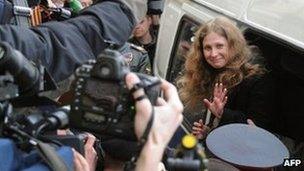Russia election: Arrests at 'Pussy Riot' hearing
- Published
Police have arrested protesters outside a Moscow court during a custody hearing for three women accused of violating public order at a cathedral.
At least 20 people were detained, both supporters and Russian Orthodox opponents of the women, said to be members of a punk band, Pussy Riot.
The women were arrested last month after an obscene political song was played inside the cathedral in Moscow.
At least two of them deny being in the group or taking part in the action.
The court is deciding whether to keep them in custody ahead of their trial.
If convicted of violating public order, the women could face up to seven years in prison.
Around 100 people had gathered outside the court building, with supporters of the women chanting "Freedom". Witnesses described seeing flares being set off and an egg being thrown by an Orthodox activist at the husband of one of the accused women.
The women's detention has caused an outcry among human rights organisations with Amnesty International declaring them "prisoners of conscience, external".
Lyudmila Alexeyeva, head of the Moscow Helsinki Group, Russia's oldest independent human rights organisation, said the women should never have been arrested in the first place.
"What they did does not deserve such a long period of imprisonment," she said.

Yekaterina Samutsevich waved as she arrived for the court hearing in Moscow
Maria Alekhina and Nadezhda Tolokonnikova, arrested on 3 March, have denied being in the punk group or taking part in the performance.
A third woman, Yekaterina Samutsevich, was arrested on 15 March.
Pussy Riot members, their faces masked with balaclavas, performed their controversial Punk Prayer inside Christ The Saviour Cathedral on 21 February, later releasing a video of the event.
The song, which has an obscene chorus, savages Vladimir Putin, controversially re-elected last month for a third term as Russian president, and also appears to mock Patriarch Kirill, head of the Russian Orthodox Church.
The Patriarch's official spokesman, Archpriest Vsevolod Chaplin, told the BBC that "the main task of the state and society is to guarantee that nothing of that kind happens again and in this sense I think the state and society should be severe".